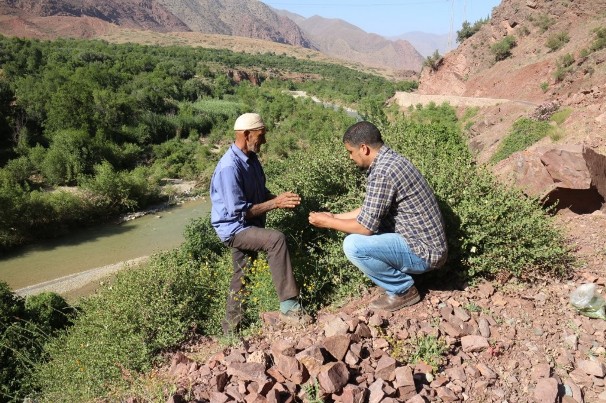Conserving Traditional Crop Diversity and Wild Medicinal Plants in Morocco

– Conserving Traditional Crop Diversity and Wild Medicinal Plants in Morocco, by Abderrahim Ouarghidi (Agricultural Expert), Worldstage, 21 May 2018.
• Arabic: Al-Watan Voice, 12 May 2018.
Morocco is a key producer of fruits and vegetables for global markets thanks to the government’s push for commercialized crop production – but at what cost? This article explores how “modern” crops have threatened not only Morocco’s agrobiodiversity and local crop varieties but also the country’s small-scale farmers, customary farming practices, community and individual economic welfare, and even cultural traditions.
The author – Abderrahim Ouarghidi, Ph.D. of Penn State University, PA, USA – also introduces the High Atlas Foundation (HAF) and the ways in which the nonprofit aims to alleviate agricultural concerns by implementing sustainable agricultural development practices throughout Morocco.
Yours faithfully,
Yossef Ben-Meir, Ph.D.
Marrakech
—————
Conserving Traditional Crop Diversity and Wild Medicinal Plants in Morocco
Abderrahim Ouarghidi, Ph.D.
Farmer-to-Farmer Volunteer
Marrakech
The Moroccan proverb “New things have a charm and old ones should be preserved” has wide applicability in current Moroccan agricultural practices and attitudes toward conventional and local crop varieties. The revealing adage is part of the Moroccan identity and way of life. Moroccan people are committed to establishing a distinctive modernity based upon existing cultural traditions of which high value is placed.
For instance, there is great preference for local or “beldi” foods, such as “a’slhur” (pure unfiltered honey), “zit ud” (olive oil), and “shriha skouria” (a local fig variety) that have always been appreciated and valued delicacies. Nearly all Moroccan communities consider “beldi” food items to be healthy, tasty, and nutritious.
Despite this, government agencies responsible for deciding agricultural policy and education in Morocco often focus heavily on commercialization, profit, and production for global markets. The effort to create a continuously thriving agricultural sector has undoubtedly positioned Morocco as a key producer of fruits and vegetables for European and international markets. However, in the process, local knowledge and practices of small-scale farmers have been inadvertently undermined, consequently leading to the loss of agrobiodiversity and traditional crop varieties.
Although such crop varieties are highlighted in Morocco’s “Green” strategic plan for agriculture, limited attention has been given to local crops, agricultural practices, and species, which represent a fundamental genetic resource for small farmers and the future of these crops on a global scale. The genetic diversity preserved in crop varieties can provide the raw materials needed to ensure continued production in the face of water scarcity as well as rapid climate and environmental changes.
Promoting local seed diversity results in greater diversity of crops on farms, thereby providing resilience to environmental and market shocks while simultaneously maintaining local practices and values. Growing traditional varieties in addition to those for export would allow farmers to also target local markets and support healthy aspects of customary Moroccan diets and cuisine.
To help return conventional crop varieties to farms in Morocco, the High Atlas Foundation (HAF) has been working with the Farmer-to-Farmer program (funded by USAID and administered by Land O’ Lakes) to assess the current status of local agrobiodiversity and create a seed bank to preserve local crops, wild relatives, and wild medicinal plants. The mission of this project is to demonstrate the inherent value of these crops and their wild relatives as well as to make sure farmers who reintroduce such varieties to their farms have access to planting material. This work supports HAF’s greater mission to achieve sustainable agricultural development and promote sustainable local varieties and practices for both food security and conservation in Morocco.
The extensive assessment we performed in the fall and winter of 2017-18 suggests a tremendous shift has occurred, resulting in the loss of local crop varieties and genotypes in addition to accustomed agricultural practices. We found widespread replacement of diverse, standard varieties with very few high-yielding ones, including apples, almonds, and plums. These newly introduced crops are considered “modern” and genetically enhanced, and are heavily championed by governmental programs encouraging intensive agriculture. Agricultural priorities for export markets promoted through different programs are directly contributing to genetic erosion and, in some cases, lead to unsustainable agriculture.
There is an immediate need for greater attention to the inequality in access to the benefits of current agricultural transitions, especially for small-scale farmers in terms of agricultural inputs and vulnerability to both market and environmental shocks. During our fieldwork, several farmers raised concerns regarding the cost of treatment for infected modern varieties of apples in addition to the amount of labor needed to grow them. According to farmers, crops bred from traditional “beldi” varieties not only minimize costs but also require less intervention.
Another way in which HAF aims to alleviate these issues is by collecting seeds from wild plants with economic value. Some households in parts of rural Morocco gain a substantial portion of their income through the sale of medicinal plants collected from the wild. Collectors and stakeholders of medicinal plants stated that the populations of some plants – including pellitory, wild sage, and thyme – are decreasing, and that they are keen to discuss the possibility of domesticating them.
In addition to creating a Seed Bank system to preserve crop varieties and threatened wild endemic species, it is imperative to implement creative, inclusive, and diverse approaches to improve agriculture and livelihoods. Local communities must be respected for the real value they add to agrobiodiversity and food systems. In this context, HAF is playing an important role working with local farmers to guarantee the use of local crop varieties and species that use water efficiently as well as require less pesticides and insecticides.
Dr. Abderrahim Ouarghidi – a High Atlas Foundation Farmer-to-Farmer Volunteer – is an Assistant Research Professor at the Department of Ecosystem Science and Management, Pennsylvania State University.

Photo: Abderrahim Ouarghidi (author) discussing with a farmer about varieties of local crop seeds and medicinal plants in the Ouirgane municipality, Marrakech region, Morocco.